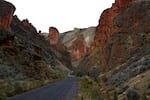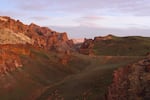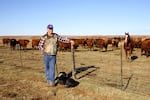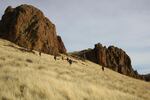
Leslie Gulch in Southeastern Oregon is within the area that conservationists hope to protect in the Owyhee.
Amanda Peacher / OPB
Following the militant occupation of the Malheur National Wildlife Refuge, the Obama administration is weighing whether to move forward with a huge land conservation proposal in an Oregon county that has drawn strong local opposition.
A decision by President Barack Obama to protect up to 2.5 million acres surrounding the remote Owyhee Canyonlands could help cement his legacy for protecting the country’s wild lands.
But the action could also further inflame critics of federal land management and complicate efforts to restore calm to the vast high plains country of southeastern Oregon.
The sensitivity of the fate of the Owyhee Canyonlands is such that the group leading the charge for the national monument — the Oregon Natural Desert Association — doesn't want to talk about it while officials are still struggling to remove the remaining occupiers.
“I don’t think it’s productive for us to speculate about what (the occupation) means to other areas,” said Brent Fenty, the desert association’s executive director. “I just don’t think this is a conversation to have right now.”
Fenty’s group has joined with several national environmental groups pushing Obama to use his broad powers under the Antiquities Act of 1906 to protect the Owyhee Canyonlands, a rugged landscape of river gorges, mountains and desert. Portland-based Keen Footwear last year launched its own campaign in support of monument designation for the Owyhee and four other scenic areas around the country.
The White House website boasts that Obama has already protected more square miles under the Antiquities Act than any other president, although the vast majority has been in marine sanctuaries. Consideration of national monuments has stepped up as Obama enters the last year of his term, which is when presidents often take actions that don’t require congressional action and are aimed at cementing their legacy.
Oregon lawmakers put out the word last fall that the administration was studying whether to include the Owyhee Canyonlands, which is named for three Hawaiian trappers who were killed there on an expedition in the early 1800s.
Related: Protecting The Owyhee Means Different Things To Conservationists, Local Residents
"All the arrows are pointing to a designation," said Bob Skinner, a Jordan Valley rancher who leads Citizens in Opposition to the Owyhee Canyonlands Monument. He said he heard from Sens. Ron Wyden and Jeff Merkley, both D-Ore., as well as from his congressional representative, Republican Greg Walden, that the administration was considering the designation.
Merkley said in an interview that he resisted introducing legislation on the Owyhee, saying he preferred to focus on wilderness proposals that have local support. The senator said he hasn’t taken a stand on the Owyhee proposal.
Merkley said he wants to make sure the White House understands “all the concerns the community expresses. ... If the administration chooses to do a monument, I want to make sure they address those issues.”
Wyden has also stayed neutral, said Wyden's spokesman Keith Chu, adding that “he’s definitely asked for feedback from everyone who has an interest.”
Walden, who teed off on federal land management policies in a House floor speech after the refuge occupation began, has repeatedly criticized the Owyhee proposal.
His spokesman, Andrew Malcolm, said this week that the congressman is frustrated the administration has not said anything about its consideration of the Owyhee.
“One way they could help lower tensions in eastern Oregon is to come out and say, ‘This is off the table; it’s not something we’re going to do,'” said Malcolm. “Alternatively, they could say this is something in the works and at least be honest with people.”
The Owyhee Canyonlands are under the jurisdiction of the Bureau of Land Management, which is part of the Department of Interior. Jessica Kershaw, the department’s press secretary, has issued this statement in reaction to requests for comment:
“No recommendations have been made from Interior to the White House about this proposal but we know that this is an important issue to many, and we will carefully consider all input about how to best manage these lands for current and future generations.”
Andy Kerr, an environmental consultant who splits his time between Washington, D.C. and Ashland, Oregon, tracks presidential use of the Antiquities Act.
Kerr said Obama has delegated much of the decision making on monuments to the White House Council on Environmental Quality. The White House did not respond to requests for comment.
At this point locals and elected officials are left to speculate about how seriously the administration is looking at an Owyhee designation — and whether its deliberations would be affected by the occupation.

Residents and conservationists disagree over what should be done to protect the Owyhee region in southeastern Oregon.
Amanda Peacher / OPB
Portland Congressman Earl Blumenauer, a Democrat who backs greater protection for the Owyhee, said he thinks the backlash against the occupation could actually encourage the administration to act.
"I think that the more the public understands what is at stake, the more people understand the value of these public lands ... and who they belong to," Blumenauer said.
But others say the administration may not want to reignite the anti-federal government sentiment that led to the occupation.
“That’s the $64,000 question,” said Skinner, the Jordan Valley rancher, adding that he didn’t know what impact the designation would have.
For now, Skinner said, local officials and residents who packed a meeting in the fall on the proposal have said they’re not interested in trying to reach a compromise with the administration.
“They don’t want any part of it,” he said, noting that opponents fear that federal land managers would gradually tighten restrictions on ranching, hunting and other traditional uses.
Blumenauer said that if the administration proceeds, he believes there will be opportunities for the public to weigh in before a decision comes. Even though administration officials aren't talking now, he said, "It's not going to be something that hits like a lightning bolt."




